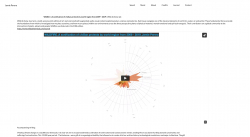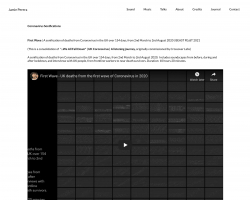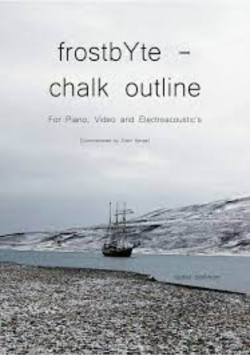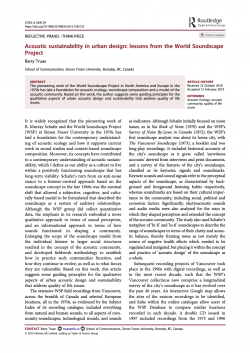Wildfire - A Sonification Of Civilian Protests By World Region From 2009 - 2019

Type
Audio/Visual
Authors
Perera ( Jamie Perera )
Category
Creative Works
[ Browse Items ]
Publication Year
2020
Publisher
JPML, Portugal
URL
[ private ]
Duration
3:04
Tags
Abstract
Commissioned by Wild Alchemy Lab for their Journal - 'Fire' Edition in 2021. Included in Climarted Gallery Melbourne's Fire exhibition 2022.
"Viewing climate change on a 12,000 year timescale, it is clear we are in an unprecedented acceleration of earth system and socioeconomic trends, sending life on our planet hurtling towards uncertainty and suffering if not extinction. This 12,000 year period - The Holocene - was a gift of rare geological stability that allowed us to create all of our written history, technological revolutions, and major civilisations. The gift was then squandered with the industrial exploitation of ourselves and nature, destabilising our ecology to such an extent that in May 2019, the International Commission on Stratigraphy voted in favour of recognising the Anthropocene - described as a time in which many geologically significant conditions and processes have been profoundly altered by human activities - as a formal chrono-stratigraphic unit. We are in the Anthropocene. Our state of collective ecological grief is firmly set at denial. We don’t know how to stop. We don’t know how to move from a parasitic to a symbiotic relationship with ourselves, let alone the earth.
However, in these ominous datasets there is one recent trend that dares to be hopeful. The world has experienced more political uprisings in the past decade than ever before, with the size and frequency of recent protests far exceeding numbers even from past protest eras such as the late-1960s, late-1980s, and early 1990s. This in Holocene terms - i.e. the amount of protests that have happened in the last 12,000 years - is the equivalent of a wild explosion, ignited by recent transgressions, and fuelled by grass-roots campaigning against decades, sometimes centuries, of inequity.
It is equally significant that through global increases in communications technology, education and perceptions of inequality, protests appear to be challenging our moral bedrock. In the last decade alone, The Arab Spring, Occupy, #Metoo, Black Lives Matter, worldwide climate protests, and movements around the world for gender equality and LGBTQ+ rights have redefined the narrative on what equality and social justice is, even as some movements seem to fail in achieving sustained change. Phrases such as “the one percent”, “metoo”, and “black lives matter'' are now in our global vocabulary. Localised phrases such as Hong Kong’s “香港人, 加油”(“Hongkongers, add oil”), or in Egypt’s Tahrir Square ""Aish, horria, adala igtimaiya"" (""bread, freedom, social justice""), remind us that real victory is about how you set yourself against power, even if you are losing. Things that appeared unspoken and perhaps beyond challenge are now being questioned with greater frequency, leading to an awareness of morality that is not handed down from post-colonial power cultures, nor dictated to by shared myths that are a legacy of the same. This revelation finds itself increasingly on the streets when there is no other recourse, seeking deconstruction, rewilding and transformation, but also when the fire of protest has passed, it finds itself in self-reflection and new shoots of understanding.
The explosion of protest over the last decade is a kind of wildfire; a destructive force, but also a natural catalyst for ecological balance. Fossilised charcoal shows evidence of wildfires soon after terrestrial plants appeared 420 million years ago, occurring throughout the history of terrestrial life, suggesting pronounced evolutionary effects on most ecosystems' flora and fauna. Nature has evolved with fire to clear out dead organic material that would otherwise choke the growth of smaller or new plants, prevent organisms in soil from reaching nutrients or block animals from the soil. Some organisms require fire to reproduce; pine cones from many pine tree species are covered in resin, which must be melted by fire for the seeds to be released. The endangered Karner blue butterfly caterpillar requires fire to support an ecosystem balance in which it’s sole food source can thrive.
Wildfire is the destruction of matter for ecological renewal. Drawing parallels, rewilding the self renews the human as an entity that claims its fundamental rights. The action can be instantaneous, a spark igniting tinder in a forest, a breaking point in an individual, or a 10 year flashpoint in the Anthropocene. “The radical act is utmost happiness,” says Arundhati Roy, on the revelations of women who found their power protesting the Narmada Valley Dam, and within this power even made public choices on being gay in India, a country where many women don’t have the power to shape their lives or exercise their own will. What is this moment of transformation that no-one, not even the most authoritarian regime, can prevent us from experiencing? What does it feel like?
Sonifying an object to feel its associated information and issues is a practice that can break down aspects of bigger, seemingly impenetrable hyper-objects. If we move between scales, the slow explosion of protest over the last decade can also relate to the instant transformation of the self when insisting on our rights against power. I am aware of my agency; in expressing this data with sounds of fire, tone, and global root causes of unrest, I choose to question my foundations, to deconstruct, to rewild, to create sanctuary in recalibration. There are many parts of my conditioning that no longer serve me because they are a manifestation of a parasitic old world. A decrepit, insane construct that pits human against human, and human against planet. I reject this as dead decaying material that must burn to furnish new growth.
To reveal universal human commonalities we must reject, deconstruct, burn all structures of human division, possibly to the point of fundamental ambivalence, and find meaning in what remains. What can we achieve by reducing our system to its ecological unframed nuances, and what will grow from the ashes? Early 20th century Dada rejected war and capitalism for peace and egalitarianism. Black Dada Nihilismus and Black Dada reject white dominant structures to talk about the future while talking about the past. In this form of “Green Dada” or “Eco-Dada”, we reject structures of division for our collective ecology."
"Viewing climate change on a 12,000 year timescale, it is clear we are in an unprecedented acceleration of earth system and socioeconomic trends, sending life on our planet hurtling towards uncertainty and suffering if not extinction. This 12,000 year period - The Holocene - was a gift of rare geological stability that allowed us to create all of our written history, technological revolutions, and major civilisations. The gift was then squandered with the industrial exploitation of ourselves and nature, destabilising our ecology to such an extent that in May 2019, the International Commission on Stratigraphy voted in favour of recognising the Anthropocene - described as a time in which many geologically significant conditions and processes have been profoundly altered by human activities - as a formal chrono-stratigraphic unit. We are in the Anthropocene. Our state of collective ecological grief is firmly set at denial. We don’t know how to stop. We don’t know how to move from a parasitic to a symbiotic relationship with ourselves, let alone the earth.
However, in these ominous datasets there is one recent trend that dares to be hopeful. The world has experienced more political uprisings in the past decade than ever before, with the size and frequency of recent protests far exceeding numbers even from past protest eras such as the late-1960s, late-1980s, and early 1990s. This in Holocene terms - i.e. the amount of protests that have happened in the last 12,000 years - is the equivalent of a wild explosion, ignited by recent transgressions, and fuelled by grass-roots campaigning against decades, sometimes centuries, of inequity.
It is equally significant that through global increases in communications technology, education and perceptions of inequality, protests appear to be challenging our moral bedrock. In the last decade alone, The Arab Spring, Occupy, #Metoo, Black Lives Matter, worldwide climate protests, and movements around the world for gender equality and LGBTQ+ rights have redefined the narrative on what equality and social justice is, even as some movements seem to fail in achieving sustained change. Phrases such as “the one percent”, “metoo”, and “black lives matter'' are now in our global vocabulary. Localised phrases such as Hong Kong’s “香港人, 加油”(“Hongkongers, add oil”), or in Egypt’s Tahrir Square ""Aish, horria, adala igtimaiya"" (""bread, freedom, social justice""), remind us that real victory is about how you set yourself against power, even if you are losing. Things that appeared unspoken and perhaps beyond challenge are now being questioned with greater frequency, leading to an awareness of morality that is not handed down from post-colonial power cultures, nor dictated to by shared myths that are a legacy of the same. This revelation finds itself increasingly on the streets when there is no other recourse, seeking deconstruction, rewilding and transformation, but also when the fire of protest has passed, it finds itself in self-reflection and new shoots of understanding.
The explosion of protest over the last decade is a kind of wildfire; a destructive force, but also a natural catalyst for ecological balance. Fossilised charcoal shows evidence of wildfires soon after terrestrial plants appeared 420 million years ago, occurring throughout the history of terrestrial life, suggesting pronounced evolutionary effects on most ecosystems' flora and fauna. Nature has evolved with fire to clear out dead organic material that would otherwise choke the growth of smaller or new plants, prevent organisms in soil from reaching nutrients or block animals from the soil. Some organisms require fire to reproduce; pine cones from many pine tree species are covered in resin, which must be melted by fire for the seeds to be released. The endangered Karner blue butterfly caterpillar requires fire to support an ecosystem balance in which it’s sole food source can thrive.
Wildfire is the destruction of matter for ecological renewal. Drawing parallels, rewilding the self renews the human as an entity that claims its fundamental rights. The action can be instantaneous, a spark igniting tinder in a forest, a breaking point in an individual, or a 10 year flashpoint in the Anthropocene. “The radical act is utmost happiness,” says Arundhati Roy, on the revelations of women who found their power protesting the Narmada Valley Dam, and within this power even made public choices on being gay in India, a country where many women don’t have the power to shape their lives or exercise their own will. What is this moment of transformation that no-one, not even the most authoritarian regime, can prevent us from experiencing? What does it feel like?
Sonifying an object to feel its associated information and issues is a practice that can break down aspects of bigger, seemingly impenetrable hyper-objects. If we move between scales, the slow explosion of protest over the last decade can also relate to the instant transformation of the self when insisting on our rights against power. I am aware of my agency; in expressing this data with sounds of fire, tone, and global root causes of unrest, I choose to question my foundations, to deconstruct, to rewild, to create sanctuary in recalibration. There are many parts of my conditioning that no longer serve me because they are a manifestation of a parasitic old world. A decrepit, insane construct that pits human against human, and human against planet. I reject this as dead decaying material that must burn to furnish new growth.
To reveal universal human commonalities we must reject, deconstruct, burn all structures of human division, possibly to the point of fundamental ambivalence, and find meaning in what remains. What can we achieve by reducing our system to its ecological unframed nuances, and what will grow from the ashes? Early 20th century Dada rejected war and capitalism for peace and egalitarianism. Black Dada Nihilismus and Black Dada reject white dominant structures to talk about the future while talking about the past. In this form of “Green Dada” or “Eco-Dada”, we reject structures of division for our collective ecology."
Description
https://www.jamieperera.com/wildfire
Number of Copies
1
| Library | Accession No | Call No | Copy No | Edition | Location | Availability |
|---|---|---|---|---|---|---|
| Main | 389 | 1 | Yes |



